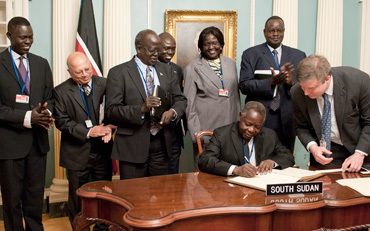IMF warns of further deteriorating economy in South Sudan
June 2, 2016 (JUBA) – The world’s economic centre house – the International Monetary Fund (IMF) based in New York – has warned of further deteriorating economic situation in South Sudan unless quick economic reform policies were adopted and political environment eased.

According to the IMF team, said the current approach by government of South Sudan to its economic situation is wrong, stressing that the deficit in 2016/17 could top US$1.1 billion or 25 percent of Gross Domestic Product (GDP). It added that if deficit is financed through borrowing from the central bank or accumulation of arrears, as is the case now, the situation would continue to fuel inflation and put further downward pressure on the exchange rate.
It recommended that restoring macroeconomic stability in the world’s youngest nation would require collaborative efforts from South Sudan and its development partners in changing the policies and restoring political and security stability in the war-ravaged country.
“If macroeconomic policies do not change, the economic situation will deteriorate further, resulting in more humanitarian suffering and potentially threatening the still-fragile peace process,” partly reads the IMF’s statement, which was released on Wednesday.
“The peace agreement signed in August 2015 has now registered significant progress with the formation of the Transitional Government of National Unity (TGoNU). However, political reconciliation must now be consolidated and the TGoNU should work as a cohesive government for it to chart a new course toward broad-based and inclusive economic development,” it added.
South Sudan government, the IMF team further argued, must also do its part by raising non-oil revenue and cutting expenditures, particularly in the payroll, current operations, travel, and investment.
Moreover, it added that, there is a need to strengthen expenditure controls, budget preparation, and to limit arrears accumulation.
“These measures could reduce the fiscal gap to about US$300 million. Meanwhile, the central bank should regain control over monetary policy by refraining from lending to the government, setting inflation on a decelerating path, and gradually start replenishing its international reserves,” it advised in the statement.
It, however, said by not succumbing to the measures in reforming the economy, it would be impossible for the government to meet its obligations, including expenses related to the peace deal, suggesting needs to cover this remaining gap from external sources.
IMF however said the donors may not come forth with provision of financial support to the South Sudanese transitional government unless such measures are adopted and implemented.
“Strong policy efforts by the government could lay the basis for donors to play a role in providing support to close the fiscal gap, including through budget support. The mission urges the government to restore credibility by not only preserving peace and the rule of law, but also by starting to implement a stronger public financial management framework and enhancing transparency in its financial transactions,” stressed the New York-based financial body.
Demonstrating political unity and commitment in the coming months to economic stabilization and strengthening public financial management, the IMF said, “Will be key steps to rebuilding policy credibility and regaining access to external financial support.”
The IMF’s high level delegation during their three days visit to the South Sudanese capital, Juba, between 30 May and 1 June, met with President Salva Kiir, First Vice President, Riek Machar, Vice President, James Wani, Finance minister, Deng Athorbei, and governor of the Bank of South Sudan (BoSS), Kornelio Koryom.
South Sudan has suffered political instability and external shocks over the last two and a half years. Since the civil war started on 15 December 2013, around two million people have been displaced, exacerbating an already dire humanitarian situation.
The decline in oil production by almost half in the oil producing states of Unity and Upper Nile and the sharp drop in international oil prices caused large shortfalls in foreign exchange receipts and government revenue.
“The country is experiencing an economic crisis with a sharp decline in national income and high inflation, which approaches 300 per cent,” IMF further warns.
Moreover, the value of the South Sudanese pound, it said, has dropped by close to 90 per cent since the exchange rate liberalization in December 2015, while central bank international reserves have dwindled to a few days of import coverage.
South Sudan depends on oil revenues by 98 per cent of its budget as non-oil revenues have not been tapped for the past 10 years of existence either as a semi-autonomous entity or independent country.
Observers say despite being oil-rich, South Sudan is likely to record negative gross domestic product growth in 2016 after growing by 30.7 percent two years ago, largely due its conflict, decline in oil production and global fall in oil prices.
The country imports from regional countries both food and non-food items despite that over 90 per cent of its land is arable and the nation has millions of animals, including cattle, sheep and wild life.
Its economy has not been diversified for the past 10 years as corruption took its toll with billions of dollars believed to have been squandered over the years by some senior government officials.
Although potentially rich, South Sudan is ranked one of the poorest in Africa and the world at large, with the worst indicators of health, education and underdevelopment.
(ST)
